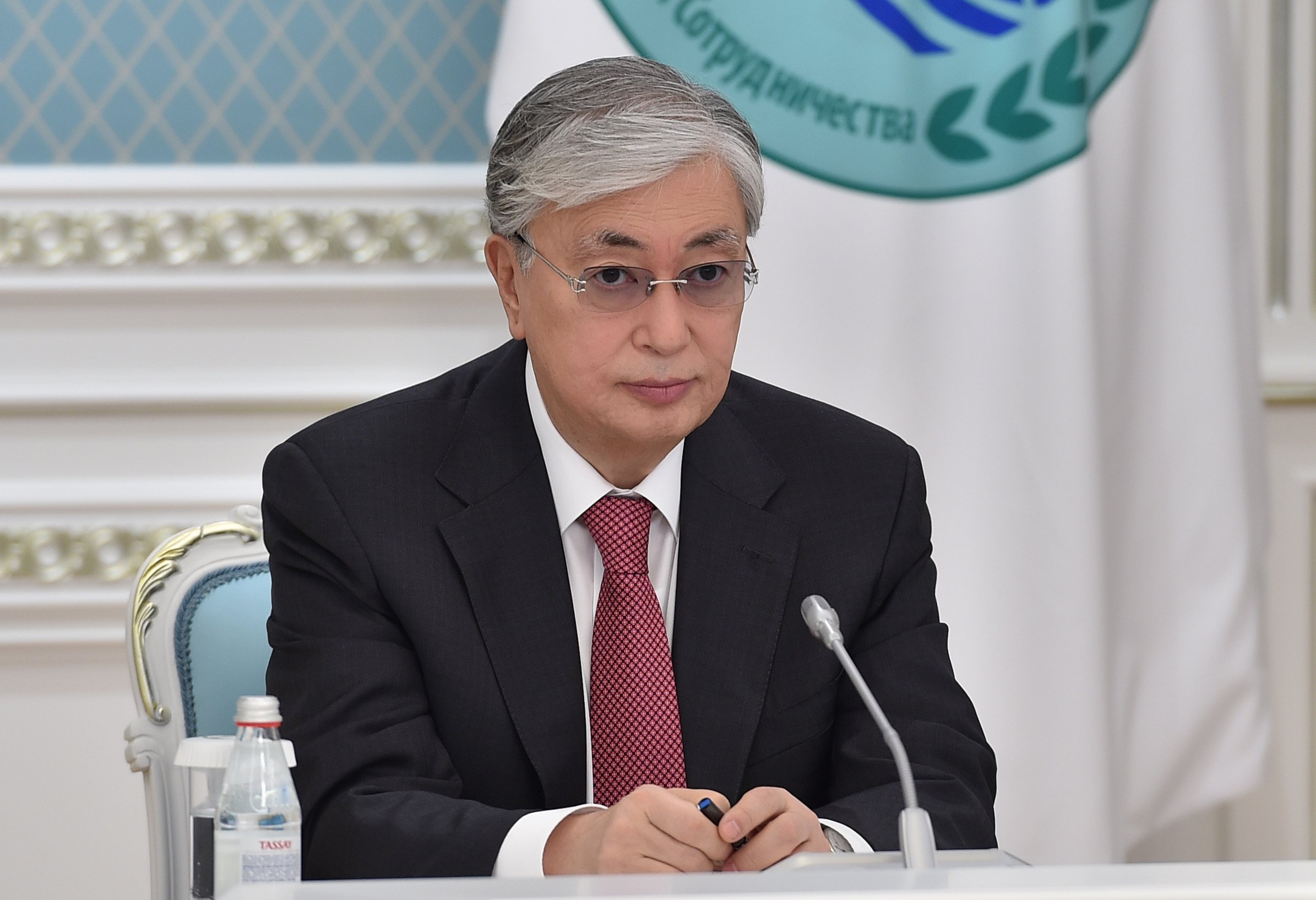NUR-SULTAN – The Shanghai Cooperation Organization has evolved into one of the most successful international organizations and become an efficient tool to strengthen cooperation and trust between countries, said Kazakh President Kassym-Jomart Tokayev addressing the video conference of the SCO Heads of State Council Nov. 10, reported Akorda press service.

Kassym-Jomart Tokayev. Photo credit: Akorda press service
The meeting of the council, a top decision making body in the SCO, was chaired by Russian President Vladimir Putin. Tokayev thanked him for organizing the forum.
Tokayev said the SCO has come a long way in its 20 years of existence.
In 2001, China, Kazakhstan, Kyrgyzstan, Russia, Tajikistan, and Uzbekistan established the SCO to join efforts in strengthening stability and security in the countries. India and Pakistan joined in 2015. SCO observer countries include Afghanistan, Belarus, Iran, and Mongolia. SCO dialogue Partners include Armenia, Azerbaijan, Cambodia, Nepal, Turkey, and Sri Lanka.
The organization now accounts for 40 percent of the world’s population and a third of global GDP. But the coronavirus pandemic, according to Tokayev, has become a tough test for the global community experiencing a global economic slowdown.
“Under these circumstances, we must find an effective solution to the most pressing questions as to how we adapt the SCO to difficult realities for the sake of our citizens’wellbeing. I am confident that the Shanghai spirit, and the solid experience of our joint search for consolidated responses will eventually enable us to solve this critical task. Kazakhstan believes it is crucial that common efforts be directed towards helping the people. We will strengthen our collective immunity in the face of the pandemic and other global challenges,” said Tokayev.
Tokayev commended the organization’s response to the negative consequences stemming from the coronavirus outbreak, and praised the support and mutual assistance offered between SCO member states.
He also stressed the importance of his country’s initiative to establish a network of regional centres for disease control and biosafety under the auspices of the World Health Organization.
The meeting participants noted the instability in the Middle East and North Africa that may serve as a source of terrorism and drugs and arms trafficking.
“Global turbulence resulted in an unwanted surge in three evil forces – separatism, terrorism and extremism. Active implementation of the programme of cooperation of the SCO member states in countering terrorism, separatism and extremism, including online, is seen as an adequate response by our organisation to the growing risks. The transfer of many areas of social and economic life to online space makes cybersecurity even more important. That is why we call for the prompt establishment of an information security centre on the basis of the SCO Regional Anti-Terrorist Structure,” said Tokayev.
The situation in Afghanistan was also on the meeting agenda. Tokayev reaffirmed his country’s commitment to helping Afghanistan achieve a sustained and durable peace and rebuild its social and economic systems.
“It is obvious at this moment that it is no longer possible to defeat the three evils (errorism, separatism and extremism) by force. To mobilise the potential of the people to counter terrorism, extremism, separatism and the devaluation of spiritual values, it is important to develop the unique cultural heritage of the SCO countries,” said Tokayev expressing his support for a measure to designate next year as the SCO Year of Culture on the organization’s anniversary.
It is important to expand economic cooperation between member states, which was adversely affected by disrupted supply chains and address rising protectionism. Kazakhstan is ready to continue its active participation in infrastructure projects, including the Belt and Road initiative.
Tokayev also drew attention to environmental issues.
“We have to focus on environmental issues and their negative impact on social and economic development. It is therefore essential to strengthen cooperation on these issues between the relevant agencies of the SCO member states. Drawing up the register of environmental problems of the SCO that require urgent collective solutions would allow us to have a comprehensive picture of what is going on in this area,” said Tokayev.
Next year’s 20th anniversary of the SCO should remind us of the paramount importance of a consolidated approach to addressing global and regional problems, where openness and a focus on expanding international partnerships ensures the organization’s effectiveness, said Tokayev.
“The anniversary of the SCO is a good opportunity not only to celebrate its significant success, but also to identify its vulnerabilities and to reflect on its failures to learn useful lessons. Therefore, I propose to instruct the Secretariat to prepare a comprehensive analysis of the SCO’s functioning with concrete proposals for improving the organization’s mechanisms and bodies,” said Tokayev.

